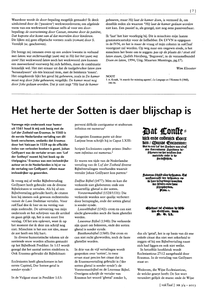The new Erasmus program requires institutions to digitize. As Breda University of Applied Sciences and Radboud University both have succesfull project in this area, they will share their best practices.
DOCUMENT
This article outlines the expected benefits of ERASMUS+ Teaching/Training Exchanges for individuals, the institution as a whole and the degree programmes of The Hague University of Applied Sciences (THUAS), the Netherlands. The method employed was a series of semi-structured interviews, following initial email contact of 32 (approx. 1.5% of staff) who had been on exchange, or were scheduled to be, during the academic year. Interviews were agreed with 7 staff. Leask (2015) identified a lack of research in this area, and it is hoped this research will help to stimulate thinking on this issue. Despite the small sample size, general preliminary conclusions can be drawn and further research is encouraged. The article examines processes and procedures in place for monitoring such exchanges, and it also explores control and monitoring prior to the exchange taking place, as well as post-exchange outcomes and evaluations. It describes the context and theoretical frameworks and discusses the major findings, including accounts of the participants’ experiences and the benefits for them as individuals, their perceptions, their line manager’s responses and institutional policies and processes. The conclusion has recommendations for improvement based upon the participants’ comments. The main message of this article is the need to set goals for the individual and the institution and to evaluate them upon return.
DOCUMENT

Erasmus Plus project SUSWELL aims to improve Health and Well-being in Kosovo and other Eastern European countries. We asked projectleader Paul Beenen from Hanzehogeschool Groningen / Hanze University of Applied Sciences Groningen 4 main questions about his drive and motivation for SUSWELL.
LINK
This chapter discusses the role of education in the preparation of the next generation of entrepreneurs in nature conservation. Departing from the traditional conservation education, which emphasizes ecological management, the chapter is a plea for incorporating entrepreneurship in the curricula of educational programmes on rewilding ecosystems. An Erasmus Intensive Programme on European Wilderness Entrepreneurship is presented as a case study. A set of competences is defined and operationalized based on the evaluation of the first edition of the programme undertaken in Rewilding Europe’s pilot area in Western Iberia. Aspects of the learning strategies and learning environment are presented and reviewed. The conclusion of this chapter is that to learn wilderness entrepreneurship competences, an environment should be created in which students, teachers and stakeholder co-learn at the boundaries of their comfort zones.
DOCUMENT

De eerste Nederlandse vertaling van 'Laus Stultitiae' van Erasmus verscheen in 1561. De vertaler heeft gebruik gemaakt van de Leuvense Bijbel voor de vertalen van de Bijbelcitaten.
DOCUMENT

This paper is a discussion paper to support an Erasmus+ project with the name Common European Numeracy Framework (CENF) (for adults) which will start at the end of the year 2018. In the first months of 2019 the team with participants from The Netherlands, Austria, Spain and Ireland will be in the process of collecting European examples of numeracy practices and current numeracy frameworks. At the conference we will show the results of this collection to date and the initial outline of a tentative CENF. We intend to spark comments, suggestions and insights from the participants of TWG07 - Adults Mathematics Education - to enrich the collection and as feedback on the initial outline of the CENF. Another aim is to create a network of national or regional stakeholders which will support the development of a shared framework for numeracy goals and numeracy education for adults in the 21st century.
LINK
Blog over Erasmus+ uitwisseling met Universidad Complutense de Madrid
LINK